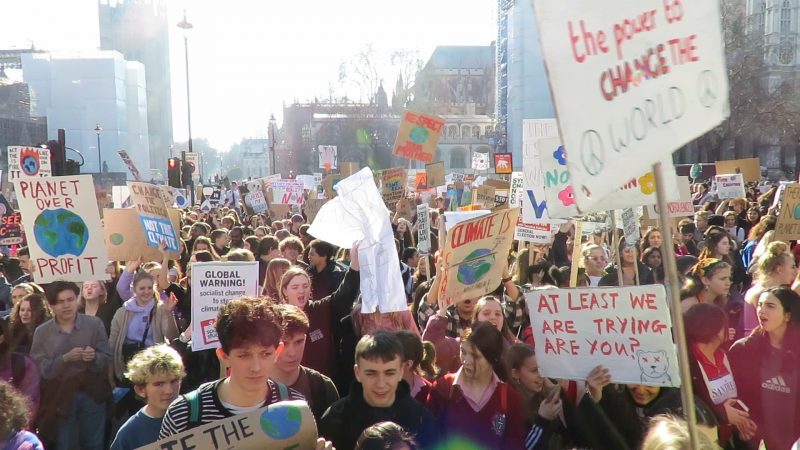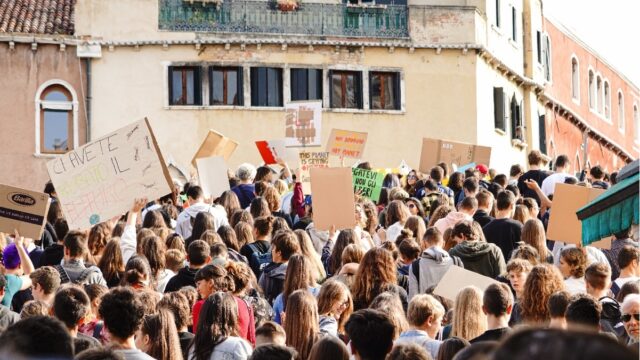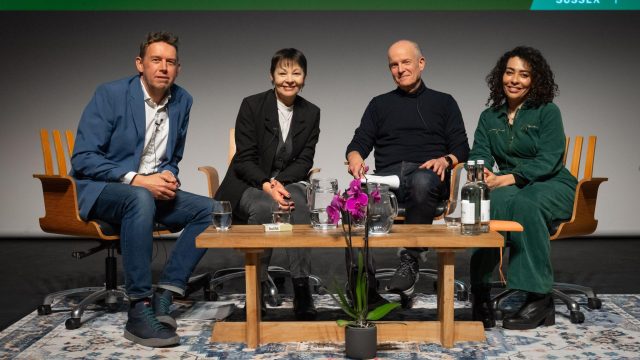The authority of innocence: the School Strike for Climate
The #YouthStrike4Climate is hugely inspiring. But school kids can't do it alone. Us adults need to get on with building a better future.

The first thing you noticed was the noise. Chants, shouts, whistling, laughter – lots of laughter – the unmistakable buzz of excited teenagers. The next thing you noticed was the banners: it seemed that every single protestor had one, homemade smears of poster paint and cardboard, papier-mâché and tissue paper. “When the leaders act like children, then the children have to act like leaders.” “If climate change is fake, then what happened to Club Penguin?”
I shinned halfway up a traffic light to get a better view of the thousands still packing into Parliament Square, a sea of placards, a mass of excitement and energy. And suddenly I was right in the heart of it: the crowd seemed to turn as one and began streaming out of the square and into the streets, swarming around my lamppost, blocking Whitehall, taking over Westminster Bridge, commandeering open-top buses and clambering atop double-deckers.
As the crowds surged around me and the noise became deafening, I realised that I was fighting back sobs. Even writing about it now, one week on, the emotion is visceral. The commitment, the belief, the sheer anarchic energy that was all around: these are the raw ingredients of hope. Clinging to that lamppost, I felt overwhelmed by a sense of possibility, the sense that, my god, these guys might actually do it. They might be the ones to cut through the complacency and usher in the age of action we so desperately need.
Why was that moment so powerful? There was some electricity in the air that day, so different from most protests and climate marches and sit-ins. Yes, the school strikers had passion and confidence and more energy than they knew what to do with, but they had something else too. I think it might have been innocence.
The anarchy of shutting down roads and clambering up Winston Churchill and jumping up and down on the roof of buses: all this was done with such childish enthusiasm, with such glee and utter lack of malice, with such innocence, that only the most churlish of commentators could criticise. In fact, it seems remarkable how little condemnation the protests themselves attracted. Picture a bunch of crusty thirty-somethings taking over buses and bringing Trafalgar Square traffic to a standstill: there would be outrage on the editorial pages, rather than expressions of support.
This innocence is a powerful thing. Across all sections of society, there is a growing sense that the world we will leave to our children is in a worse state than the one we inherited. Young people – and those yet born – are entirely innocent of the decisions that led us to this point. They bear no responsibility for the challenges of the future, and yet they will have to bear the burden of coping with them. This innocence gives them a moral authority that us adults, complicit and compromised as we are, cannot help but feel awed and slightly ashamed by.
All great movements for social change have had this moral authority on their side: the suffragettes, civil rights, colonial independence, the apartheid struggle, gay rights, Black Lives Matter, and so on. They were able to articulate a simple, powerful moral fact: we are human beings, no different to you, yet we are denied rights and freedoms that you enjoy. Confronted with the stark fact of that inequality, arguments based on tradition, culture, eugenics, misogyny and racism have, over time, dissolved in the light of humanity’s powerful and instinctive drive for fairness.
“ Your complacency is destroying our right to a future, and – in an ironic echo of that most plaintive of childish cries – that’s not fair.”
On these grounds, the young people striking from Brisbane to Belgium have an undeniably powerful moral case. They are, after all, children. We are innocent of your sins, they say. You broke it, but we must pay for it. Your complacency is destroying our right to a future, and – in an ironic echo of that most plaintive of childish cries – that’s not fair.
It’s the kind of simple moral message that has driven successful progressive movements in the past. It can resonate with the wider public, generate sympathy and support, and make opponents appear spiteful and small-minded.
But as inspiring as it has been to watch the new youth climate movement spring into existence, it would be a mistake to say – as some have done, and as I was tempted to do stuck up my lamppost – these guys will sort everything out.
They can’t sort anything out. They’re still in school. They can raise a hue and cry, but the job of changing laws, investing in green industries, and building a new climate politics remains with the adults. We need to listen to the school strikers, to hear their demands, and then get on and actually do it. Or, as John Lanchester’s powerful new novel The Wall makes clear, our children will never forgive us.
- Ben Martin


